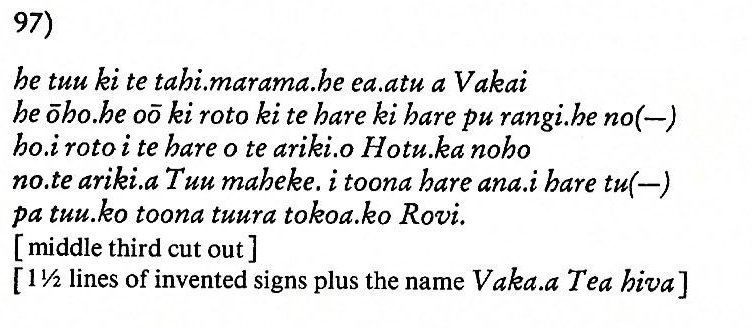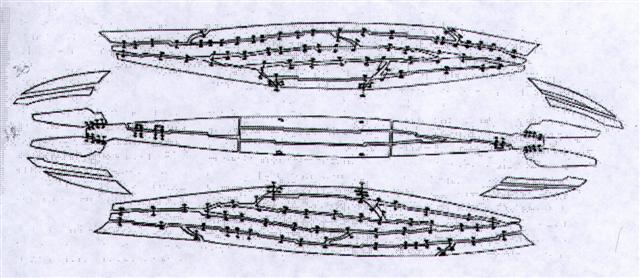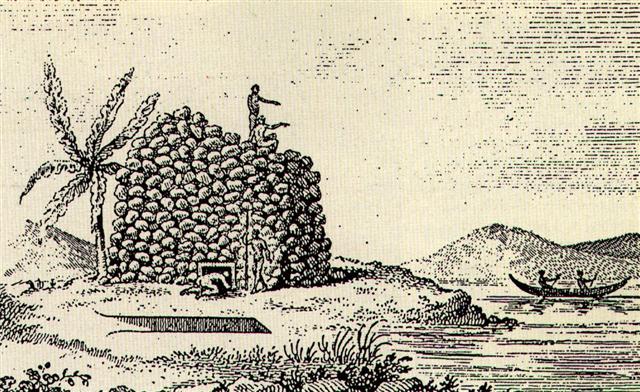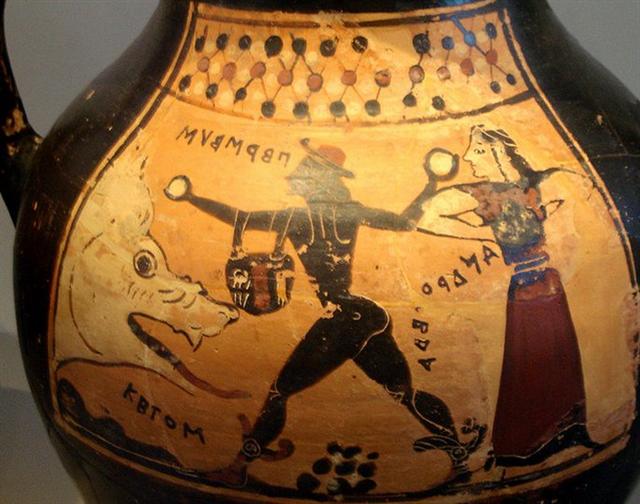
| he ea.a Vakai.he oho.he tuu.he
kakai |
Vakai arose, went away,
arrived, and quarreled with [he kakai kia]
Hotu in the following manner [penei
ē]: 'Why did
you shout [heaha.koe.e
rangi] bad things [te kī
rakerake] at King Tuu Maheke! This is how
it is [penei ē]
- King Tuu Maheke is not a bastard! [he
morore ō te ariki.a Tuu maheke]' |
| kia Hotu.penei
ē. heaha.koe.e rangi. |
| nei.i te kī
rakerake ki te ariki.kia Tuu ma(-) |
| heke.penei
ē.he morore ō te
ariki.a Tuu ma(-) |
| Kaka Kakaka (kaka).
Bark of banana-tree. Cut into strips, and left to
dry out, its fibres, hau kakaka, are used to
make small baskets, small bags etc. Vanaga. Samoa:
'a'asa, glowing hot. Tonga, Uvea: kakaha,
hot, fiery, painful. Futuna: kakā,
fiery, reddened by fire. Niuē: kakā,
hot, red-hot. Churchill 2.
Kakai. To
blame, to chide, to scold, to disapprove, to expel,
to reproach, to rebuke; debate, anger, dispute,
discussion, quarrel, reprehension, reprimand,
hostility; ivi kakai mai kakai atu,
an inharmonious family; kakai rae,
to provoke; kakai nuinui ke,
rage; toua kakai,
to rebuke. Mgv.: kaia,
wicked, cruel. Mq.: kaia,
envious, jealous, shrewish, quarrelsome, wrangling,
surly. Ta.: aia,
despicable. Churchill.
...Makoi replied, 'There are indeed all those
places. I did not forget them at all (? kai viri
kai viri) when I saw them (text corrected,
i-ui-nei). I alone saw no fewer than four of my
places, and I returned here only because night was
falling'. Then Ira spoke
again: 'How did you name them, last-born [hangupotu]?'
Makoi replied, 'This is what happened, this is how I
gave the names. I wrote (ta [?]) 'Te Manavai
A Hau Maka' on the surface of a banana leaf (kaka),
and this is how I left it'.
This is how Makoi remembered it.
No sooner had he said this, when
Ira grew angry and quarreled [he kakai] with
Makoi.
He said the following (to him): 'You did not pay
attention, last-born, and you did not [tae]
give the (full) name. This is how it should be [Penei]:
the Manavai of Hau Maka of Hiva, in memory (mo
aringa ora) of the father, of his dream
soul'. Makoi replied, 'In
Hiva the land belongs to him - the land here is
mine, not his [tae oona]!'
They stayed (there longer).
On the fifth day of the month of
July ('Anakena'), they all got up, went downhill [he
turu], went on, and reached Hanga Te Pau.
They took their provisions with them ... [E:21] |
| heke.he kī
atu e vakai.penei
ē. |
Vakai added: 'You
yourself are a bastard and a scabby head (puoko
havahava) of Tai A Mahia! |
| kokoe ana tau morore puoko.havahava.a |
| tai a Mahia.ko
kokiri tuu hongohongo.o
te hangai |
| Tahaga. Adverb:
without any particular reason, just like that.
Vanaga. 1. Only, solely, alone, wholly, without
stopping, always, quite, a sort of superlative;
noho tahaga, bachelor, keukeu tahaga, to
go without stopping; topa tahaga, quite
unexpected; puoa tahaga, always clad; nui
tahaga, to superabound; tatagi tahaga,
inconsolable; roaroa tahaga, middle finger
(the longest); tahaga no mai, a more
positively superlative statement. P Mgv.: tahaga,
only, alone, solely. Mq.: tahakahaka,
stripped of brushwood. 2. Irascible; tuhi tahaga,
to accuse, to calumniate. 3. (taha 2) A
sacrifice. Churchill. Pau. Tahaga, indecent.
Ta.: tahaa, naked. Mq.: tahanahana,
cleared, uncovered. Ma.: tahaga, naked.
Tahaki, the side. Sa.: tafa'i, one side.
Ma.: tahaki, one side. Mgv.: Tahaki, a
man with red hair and florid skin. Mq.: tahaki,
red. Ta.: Tahavahava, dirty, soiled. Ma.:
tahawahawa, to defile, to pollute. Churchill.
Vaha.
Hollow; opening; space between the fingers (vaha
rima); door cracks (vaha papare).
Vahavaha, to fight, to wrangle, to argue with
abusive words. Vanaga. 1. Space, before T; vaha
takitua, perineum. PS Mgv.: vaha, a
space, an open place. Mq.: vaha, separated,
not joined. Ta.: vaha, an opening. Sa.:
vasa, space, interval. To.: vaha,
vahaa, id. Fu.: vasa, vāsaà,
id. Niuē: vahā.
2. Muscle, tendon; vahavaha,
id. Vahahora
(vaha 1 -
hora 2),
spring. Vahatoga
(vaha 1 -
toga 1),
autumn. 3. Ta.: vahavaha,
to disdain, to dislike. Ha.: wahawaha,
to hate, to dislike. Churchill.
Kiri. Skin; bark; husk; kiri heuheu,
downy skin; kiri mohimohi (also kiri
magó), smooth hairless skin. Kirikiri miro,
multicoloured. Vanaga. Skin, hide, bark, surface;
kiri ekaeka, leprous; kiri haraoa, bran;
kiri hurihuri, negro; kiri maripu,
scrotum; kiri ure; prepuce. P Pau.: kiri,
bark. Mgv.: kiri, skin, bark, leather,
surface, color, hue. Ta.: iri, skin, bark,
leather, planking. Kirikiri, pebble, gravel,
rounded stone, sling stone; kikiri, pebble. P
Pau.: kirikiri, gravel, stony, pebbly. Mgv.:
kirikiri, gravel, small stones, shingle. Ta.:
iriiri, gravel, stony, rough. Kirikirimiro:
ragi kirikirimiro, sky dappled with clouds.
Kirikiriteu, soft gray tufa ground down with
sugar-cane juice and utilized as paint T.
Kiriputi (kiri - puti) cutaneous,
kiriputiti, id. Kirivae (kiri -
vae 1), shoe. Churchill.
Puoko.
1. Head; tagata puoko hiohio,
hard-headed, opinionated person. 2. Skull (also:
pakahera puoko). Vanaga. Head, skull, crown of a
hat; puoko garuru, headache; kiri puoko,
scalp. T. Mgv.: upoko, head (men or animals).
Mq.: upoko, upoó, head. Ta.: upoó,
human head. (Sa.: ulupo'o, skull. To.:
uluboko, id. Niuē:
ulupoko,
id.) Churchill. |
| i tuā.i
oti onge o hiva.ana kī
mai.a Taana. |
Kokiri Tuu Hongohongo
was your father (i.e., he raised your) back (i.e.,
in the west) in Oti Onge (literally, where the
hunger ends) in Hiva, because he was told to do so
by Taana A Harai!' |
| a Harai.he
hakahoki mai te ariki.a Hotu.i te |
|
... Antares, visible in the
morning sky of December-January, came to stand for
summer heat; hence the saying, 'Rehua cooks
(ripens) all fruit'. The generally accepted version
of the Rehua myth, according to Best, is that
Rehua had two wives, the stars on either side
of Antares. One was Ruhi-te-rangi or
Pekehawani, the personification of summer
languor (ruhi), the other Whaka-onge-kai,
She-who-makes-food-scarce before the new crops can
be harvested ...
|
ko oto uta |
ariki motongi |
1 |
Hamal (*0 → *30) |
|
ko tangaroa.a oto uta |
ariki motongi |
2 |
(*27 → *57) |
|
ko tiki hati.a tangaroa |
ariki motongi |
3 |
(*54 → *84) |
|
ko
roroi.a tiki hati |
ariki
motongi |
4 |
(*81
→ *111) |
|
ko tuu kumā.a roroi |
ariki motongi |
5 |
(*108 → *138) |
|
ko ataranga.a tuu kumā |
ariki motongi |
6 |
Alkes (*135 →*165) |
|
ko harai.a ataranga |
ariki motongi |
7 |
Bharani (*41) |
|
ko taana.a harai |
ariki motongi |
8 |
Aldebaran (*68) |
|
ko matua.a taana |
ariki motongi |
9 |
Canopus (*95) |
|
ko hotu.a matua |
ariki motongi |
10 |
Antares (*249) |
|
| kī.penei
ē. ai hoki koe.e
nua
ē. e tae ki ro |
To this speech King Hotu
answered [he hakahoki] the following
(analogous translation): 'Oh little mother, why did
you not tell me this in Hiva, in our homeland?' |
| mai era.i hiva ana.i tomatou
kainga |
|
Nua. 1.
Mother; this seems a more ancient word than
matu'a poreko. 2. Blanket, clothing, cape
formerly made from fibres of the mahute tree.
Vanaga. Cloak T. Churchill.
Nu'a 1.
Thick; piled one on top of the other, as
leis,
mats, or ocean swells; heaped; lush, thick-growing;
much traveled, as a road; multitude, as of people,
mass. Also hānu'a.
Moena kumu nu'a,
a sleeping mat made thick at one end to serve as a
head rest; lit. 'mat piled beginning'.
Nu'a
moena, a
heap of mats. Nu'a
kanaka, many people.
Haki nu'a ka uahi i
ke kai, the spray breaks in masses in the
sea. Ka nu'a o ka
palai, the thick clump of
palai
ferns. Ho'o nu'a,
to heap up; to give generously and continuously; to
indulge, as a child; surging, rising in swells, as
the sea. 2. A kind of seaweed. Nu'a-kea, a
goddess of lactation. Wehewehe. |
| era.he ea tau vie era he hoki he
oho |
The woman arose [he
ea tau vie era], turned around, went back to her
house, and stayed there. |
| ki toona hare.he noho. |
| he ea.a Hotu.he
neke.iti
atu.he
hakapehiva |
Hotu arose [he ea.a
Hotu], moved (his residence) a short distance
away [he neke.iti atu.he hakapehiva iti.ātu],
and settled down.
He finished building the house [he
āto.i toona hare] and covering the roof [he
oti te hare.te
ato], and now he lived in Hare Pu Rangi [he
noho.i hare pu rangi]. |
| iti.ātu.he
noho.he āto.i toona
hare.he oti te |
| hare.te
ato.he
noho.i hare pu rangi. |
|
...
The great stone statues (moai) 'walked' (he
nekeneke) to their proper places, i.e. they were
capable of moving as if by themselves
('automobiles') as if they had been nahe
plants (nehenehe, Angiopteris
evecta): ... I
remember from somewhere in Heyerdahl's books that he
considered it significant that neke-neke was
a special word in the vocabulary of Easter Island,
it meant 'walking without legs, walking by moving
the weight this side and that slowly advancing
forward'. He had discovered the word when he asked
how the statues had been moved - they walked (neke-neke)
was the answer
...
The plant was introduced by Captain Bligh from
Tahiti as a staple food for slaves and cultivated in
the Castleton Gardens in 1860. From there it was
able to distribute itself throughout the eastern
half of the island ...
Atu. Particle of meaning opposite to that
of mai; it refers to the second or third
person, expressing movement away: ka-avai-atu,
give it to him: he-oho-atu au, I am going
there, after you; i-oho-atu-era, when I had
gone there. Vanaga. 1. a. Directive, of motion from
the speaker. b. Somewhat expressive of the
comparative degree. 2. Pupil; hakaatu, proof;
hare hakaatuga, schoolhouse, class. 3. (hakaatu),
to presage. 4. (hakaatu), mark, object.
Churchill.
Pehi.
Mgv.: A ship. Mq.: pehi, a great canoe.
Churchill. Ta.: To assail with stones. Mq.: pehi,
id. Ha.: pehi, to throw stones at. Churchill.
To. 1.
Particle sometimes used with the article in ancient
legends; i uto to te hau, the ribbon was in
the float. 2. To rise (of the sun) during the
morning hours up to the zenith: he-to te raá.
Vanaga. 1. Of. T Pau., Ta.: to, of. Mgv.:
to, genitive sign. Mq.: to, of, for. 2.
This, which. Churchill. Mgv.: To, to make a
canoe of planks. Mq.: to, to build a canoe.
Sa.: to, to build. Churchill.
 |
|
 |
|
E:97 |
| he tuu ki te tahi.marama.he
ea.atu a Vakai |
When another month had
come [he tuu], Vakai set out again [he ea.atu a Vakai].
She went and entered into the house, into Hare Pu
Rangi [he
ōho.he oō ki roto ki hare pu rangi]. |
| he
ōho.he oō ki roto ki hare pu rangi.he no(-) |
| ho.i roto i te hare o te ariki.o
Hotu.ka noho |
She lived in the house
of King Hotu [he noho.i
roto i te hare o te ariki.o Hotu] while Tuu
Maheke stayed by himself [ka noho no.te ariki.a
Tuu maheke] in his own house [i toona hare
ana], in Hare Tupa Tuu, with his servant Rovi [i
hare tupa tuu.ko toona tuura tokoa.ko
Rovi]. |
| no.te ariki.a Tuu maheke. i toona
hare ana.i hare tu(-) |
| pa tuu.ko toona tuura tokoa.ko
Rovi. |
|
(lower third cut off) |
|
1½
lines of invented signs plus the name Vaka.a Tea
hiva
The
Eighth Land (p. 290): "one line of 'nonclassical'
signs (degenerated ta'u script or
self-composed graphemes). After another one-half
line, the sequence of numbers '1'´, '2', '30'. The
meaning of the sequence is not known."
1230 =
30 * 41. |

|